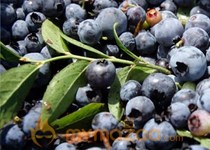Flavonoid-rich foods like blueberries, cherries, radishes and citrus fruits may reduce the risk of erectile dysfunction in men, with the greatest impact on people younger than 70. In a conducted by the University of East Anglia (UEA) and Harvard University, researchers found that in addition to eating flavonoids, a diet with a higher fruit intake overall was associated with a 14 percent reduced risk of erectile dysfunction.
Research published Friday in The American Journal of Clinical Nutrition stated Anthocyanins— found in blueberries, cherries, blackberries, radishes and blackcurrant— as well as flavanones and flavones, which are found in citrus fruits, offered the greatest benefits for preventing erectile dysfunction.
“We already knew that intake of certain foods high in flavonoids may reduce the risk of conditions including diabetes and cardiovascular disease,” lead study author Aedin Cassidy, a nutrition professor at UEA, said in a press release. “This is the first study to look at the association between flavonoids and erectile dysfunction, which affects up to half of all middle-aged and older men.”
The researchers also found that eating a flavonoid-rich diet is as beneficial in preventing the condition as briskly walking for up to five hours per week.
“Men who regularly consumed foods high in these flavonoids were 10 percent less likely to suffer erectile dysfunction. In terms of quantities, we’re talking just a few portions a week,” Cassidy said in the release.
Using data collected since 1986, researchers analyzed the answers from 50,000 middle-aged, healthy men who were asked about their ability to have and maintain an erection sufficient for intercourse, the press release said. Data on their dietary intake was collected every four years. Factors such as body weight, physical activity, caffeine consumption and smoking habits were also considered.
While more than one-third of participants reported new onset erectile dysfunction, those who consumed a diet rich in anthocyanins, favlones and flavanones were less likely to experience the condition.
“We also found that the benefits were strongest among younger men,” Cassidy said in the release.
Researchers noted men who consumed a high intake of anthocyanins and flavanones, and who were also physically active, had the lowest risk of erectile dysfunction.
“As well as improving sexual health for middle-aged men, there is another important benefit linked to heart health,” senior author Dr. Eric Rimm, an epidemiology and nutrition professor at Harvard, said in the release. “Erectile dysfunction is often an early barometer of poor vascular function and offers a critical opportunity to intervene and prevent cardiovascular disease, heart attack and even death.”
“Men with erectile dysfunction are likely to be highly motivated to make healthier lifestyle choices, such as exercising more and eating the right foods— which would greatly benefit their long-term cardiovascular health as well,” Rimm said.











